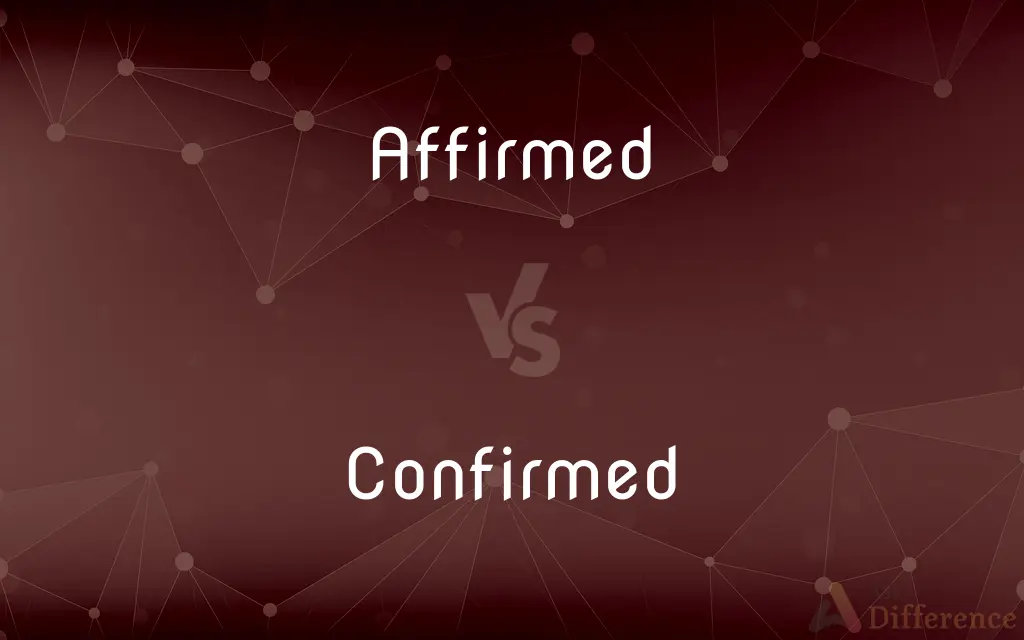Affirmed vs. Confirmed — What's the Difference?
By Urooj Arif & Fiza Rafique — Updated on April 5, 2024
Affirmed relates to stating something positively or asserting it as true, often in a legal or formal context. Confirmed implies verifying the accuracy or validity of information, emphasizing proof or endorsement.

Difference Between Affirmed and Confirmed
Table of Contents
ADVERTISEMENT
Key Differences
Affirmed often involves a declaration or assertion of truth, principle, or belief, usually in a formal or authoritative manner. It's commonly used in legal contexts or in scenarios where personal or organizational values are declared. Confirmed, on the other hand, involves the process of establishing the truth or accuracy of a previously uncertain or unverified statement or fact, often through evidence or authority.
In legal contexts, to affirm is to assert the validity of a judgment or statement, without implying any reevaluation of evidence. It reinforces a position or decision based on principles or prior conclusions. Whereas, to confirm in legal terms often involves a procedural step where an authority, like a higher court, verifies and endorses the decisions of a lower court, implying a validation process.
When discussing information or news, affirmed suggests a stance or perspective is being stated strongly and positively, often without the necessity of providing evidence at that moment. Confirmed, however, implies that the information has been checked and verified against facts or evidence, giving it a foundation of accuracy and reliability.
In the context of beliefs or commitments, to affirm is to declare one's support or belief in a clear and unequivocal manner. It's about making one's stance known publicly and strongly. To confirm, in similar contexts, might involve providing evidence or demonstrating actions that validate one's commitment or belief, thereby reinforcing its authenticity.
The usage of affirmed and confirmed can overlap, but the distinction often lies in the emphasis: affirmation leans towards the act of declaration or support, while confirmation leans towards verification or evidence-based endorsement.
ADVERTISEMENT
Comparison Chart
Definition
Asserting as true or stating positively
Verifying the accuracy or validity
Context
Legal declarations, personal beliefs
Information verification, procedural validations
Implication
Emphasis on assertion or declaration
Emphasis on evidence or authority endorsement
Usage
Formal assertions, value statements
Verification of facts, procedural confirmations
Key Distinction
Declaration based on principles or beliefs
Verification based on evidence or authority
Compare with Definitions
Affirmed
Supported or upheld.
The court affirmed the lower court's decision.
Confirmed
Endorsed formally.
The appointment was confirmed by the senate.
Affirmed
Stated positively.
The company affirmed its dedication to environmental sustainability.
Confirmed
Established as true.
The news was confirmed by multiple sources.
Affirmed
Declared as true.
The witness affirmed seeing the suspect leave the scene.
Confirmed
Reinforced or strengthened.
Recent studies have confirmed the initial findings.
Affirmed
Asserted firmly.
The leader affirmed the country's commitment to peace.
Confirmed
Validated by evidence.
His alibi was confirmed through surveillance footage.
Affirmed
Acknowledged firmly.
She affirmed her belief in democracy during the debate.
Confirmed
Verified for accuracy.
Scientists confirmed the effectiveness of the new vaccine.
Affirmed
Affirmed (February 21, 1975 – January 12, 2001) was a champion American Thoroughbred racehorse who is the eleventh winner of the American Triple Crown. Affirmed was well-known for his famous rivalry with Alydar, whom he met ten times, including coming second in all three Triple Crown races.
Confirmed
Being firmly settled in habit; inveterate.
Affirmed
To declare positively; assert to be true
A philosopher affirming the existence of free will.
A document affirming that each student has completed the course.
Confirmed
Having been ratified; verified.
Affirmed
To declare support for or belief in
Affirm the right to self-determination.
Confirmed
Having received the rite of confirmation.
Affirmed
(Law) To rule (a court decision) to have been correct; confirm
The Supreme Court affirmed the lower court's decision.
Confirmed
Simple past tense and past participle of confirm
Affirmed
To assert that one will give true testimony equivalent to that which would be given while under oath.
Confirmed
(formal) having a settled habit; inveterate or habitual
A confirmed liar
A confirmed opium-smoker
Affirmed
Simple past tense and past participle of affirm
Confirmed
Verified or ratified
A confirmed treaty
Affirmed
Thoroughbred that won the triple crown in 1978
Confirmed
(Christianity) having received the rite of confirmation
A confirmed Catholic
Confirmed
Of persons; not subject to change;
A confirmed bachelor
A confirmed invalid
Confirmed
Having been established or made firm or received the rite of confirmation;
Confirmed reservations
Received confirmed reports of casualties
A confirmed Catholic
Confirmed
Having a habit of long standing;
A chronic smoker
Common Curiosities
What distinguishes "affirmed" from "confirmed"?
"Affirmed" is about stating or asserting something as true, often based on belief or principle, while "confirmed" involves verifying or establishing the truth through evidence or authority.
Can "affirmed" and "confirmed" be used interchangeably?
While there can be contexts where their usage might overlap, they are not interchangeable due to their distinct emphasis on declaration versus verification.
How is "affirmed" particularly used in legal contexts?
In legal contexts, "affirmed" typically refers to a court upholding a decision or judgment, emphasizing support for a prior conclusion without reevaluation of evidence.
What does it mean to have information "confirmed"?
Having information "confirmed" means its accuracy, validity, or truth has been established through evidence, verification, or authoritative endorsement.
Does "affirmation" require evidence?
Affirmation doesn't necessarily require evidence at the moment of declaration; it's more about stating or supporting a position, belief, or decision firmly.
Is "confirmation" always based on evidence?
Yes, confirmation typically requires evidence, validation, or an authoritative endorsement to establish the truth or accuracy of something.
What role does "confirmation" play in scientific research?
In scientific research, confirmation is crucial for validating hypotheses, theories, or findings through empirical evidence and experimentation, reinforcing the reliability of results.
How does "affirming" a belief differ from "confirming" a belief?
"Affirming" a belief involves declaring support or conviction in that belief, while "confirming" a belief implies providing evidence or demonstrating actions that substantiate the belief.
How does one "affirm" in personal or social contexts?
In personal or social contexts, to affirm is to express support, acknowledgment, or positive assertion of values, beliefs, or the identity of oneself or others.
Can a legal judgment be both affirmed and confirmed?
Yes, a judgment can be affirmed to uphold its validity based on principles or prior decisions, and it can also be confirmed in a procedural sense by a higher authority, reinforcing its standing.
Share Your Discovery

Previous Comparison
Polish vs. Varnish
Next Comparison
Ascendant vs. AscendentAuthor Spotlight
Written by
Urooj ArifUrooj is a skilled content writer at Ask Difference, known for her exceptional ability to simplify complex topics into engaging and informative content. With a passion for research and a flair for clear, concise writing, she consistently delivers articles that resonate with our diverse audience.
Co-written by
Fiza RafiqueFiza Rafique is a skilled content writer at AskDifference.com, where she meticulously refines and enhances written pieces. Drawing from her vast editorial expertise, Fiza ensures clarity, accuracy, and precision in every article. Passionate about language, she continually seeks to elevate the quality of content for readers worldwide.














































